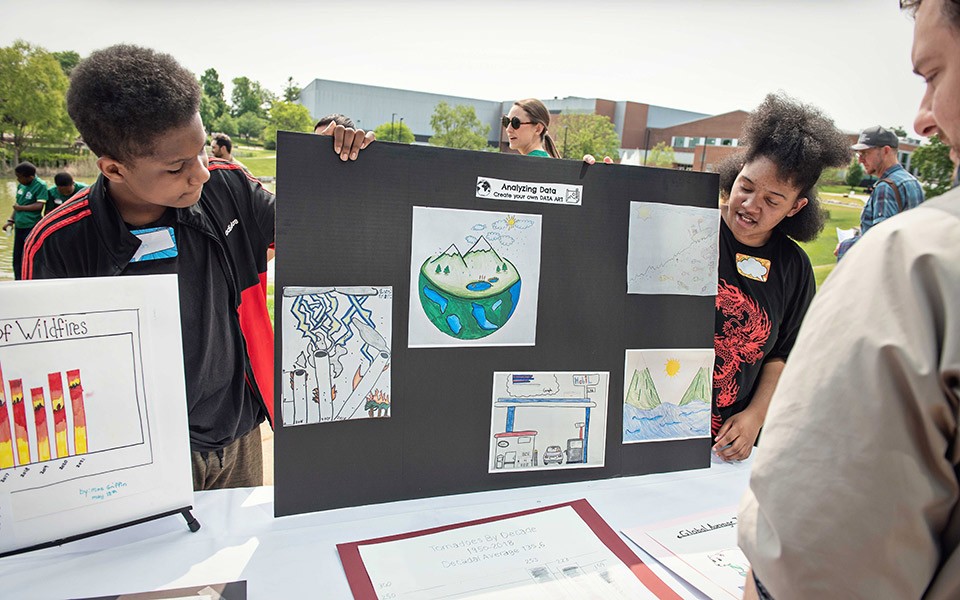NOAA Great Lakes Bay Watershed Education and Training (B-WET) program announced $941,100 in funding for seven environmental education projects throughout the Great Lakes basin. Great Lakes B-WET awards are funded through the Great Lakes Restoration Initiative.
YPSILANTI, MI—The Southeast Michigan Stewardship (SEMIS) Coalition is thrilled to announce that it has been awarded a competitive grant from the National Oceanic and Atmospheric Administration (NOAA) Great Lakes Bay Watershed Education and Training (B-WET) program.
NOAA’s Environmental Literacy Program, which is national in scope, selected six projects for funding following a highly competitive request for applications. Funded projects will use a variety of educational approaches to build the foundation for resilience to extreme weather and climate change in their communities. Together, these projects will receive $2.9 million to empower people to protect themselves and their communities from local climate impacts.
“NOAA values education, empowerment, and equity, and these awards give an important boost to NOAA’s commitment to building a climate-ready nation,” said Assistant Secretary of Commerce for Oceans and Atmosphere and Deputy NOAA Administrator Jainey Bavishi, “Because NOAA’s climate science helps communities become climate-smart and identify what they need to build resiliency, and it enables NOAA to partner with them to build it all with a sharp eye on equity and environmental justice.”
Led by EMU College of Education Professor and SEMIS Coalition Director, Ethan Lowenstein, the project addresses the urgent need to increase resilience in Detroit and southeast Michigan by partnering high school students and teachers with place-based educators, climate scientists, adaptation professionals, municipalities, and community organizations. Using an ecojustice approach to Place-Based Education (PBE), students and teachers will explore local climate impacts and develop strategies to safeguard vulnerable school campuses, households, and neighborhoods. The project locates community and climate resilience within a broader vision of youth and adult health and well-being. It is grounded in the belief that social and ecological justice issues are inseparable. Collaborations with other national leaders and innovators in climate and community resilience education in NOAA’s community of practice will be a key component of the project.
In response to the grant announcement, Lowenstein said, “Recent flooding, tree damage, air quality issues, and extreme heat have touched all of our communities. Climate change and its accelerating impacts deeply touch our children, families, schools, and futures. This generous support from NOAA recognizes the critical importance of equipping our youth with the knowledge and skills to address the challenges of climate change. Through the ‘Community Resilience from the Youth Up’ project, we are empowering our students to become prepared leaders of tomorrow, connecting them with green workforce opportunities and professionals, and fostering a stronger, more sustainable future for southeast Michigan.”
This project is led by the Southeast Michigan Stewardship Coalition (SEMIS), housed at Eastern Michigan University and part of the Great Lakes Stewardship Initiative, a statewide PBE network. Project partners include GLISA, the Great Lakes CAP/RISA team, the American Society of Adaptation Professionals (ASAP), Izzie, LLC, Detroit City Council Green Task Force, Ypsilanti Sustainability Commission, NOAA’s Climate Program Office, Great Lakes B-WET, Michigan Sea Grant, and schools throughout southeast Michigan. The project builds on the relationships, partnerships, and educational strategies developed and refined in a previous NOAA-funded project, “Climate resilience from the youth up: A place-based strategy uniting high school students, educators, residents, community organizations, and municipalities in southeast Michigan.”
About Eastern Michigan University
Founded in 1849, Eastern is the second oldest public university in Michigan. It currently serves more than 14,000 students pursuing undergraduate, graduate, specialist, doctoral and certificate degrees in the arts, sciences and professions. In all, more than 300 majors, minors and concentrations are delivered through the University’s Colleges of Arts and Sciences; Business; Education; Engineering and Technology; Health and Human Services; and its graduate school. National publications regularly recognize EMU for its excellence, diversity, and commitment to applied education. Visit the University’s rankings and points of pride websites to learn more. For more information about Eastern Michigan University, visit the University’s website. To stay up to date on University news, activities and announcements, visit EMU Today.
About The SEMIS Coalition
The SEMIS Coalition is an alliance of educators, community organizations, and environmental professionals dedicated to fostering environmental literacy and stewardship in Southeast Michigan. The coalition was formed in 2008 and is a regional hub of the Great Lakes Stewardship Initiative. Its local home is Engage@EMU and EMU’s College of Education. With the help of these entities, SEMIS has been actively engaged in providing transformative education experiences to students through an Ecojustice Education framework, cultivating their understanding of and appreciation for the natural world, and empowering youth as civic leaders. To learn more about the SEMIS Coalition, visit semiscoalition.org.
About NOAA ELP
NOAA Environmental Literacy Program (ELP) provides grants and in-kind support for programs that educate and inspire people to use Earth system science to improve ecosystem stewardship and increase resilience to environmental hazards. For more information on funded projects, please visit https://www.noaa.gov/office-education/elp/grants/awards/2022-2023-environmental-literacy-grants
Media contact:
Melissa Thrasher, Executive Director of Media Relations at Eastern Michigan University
(734) 487-4401

